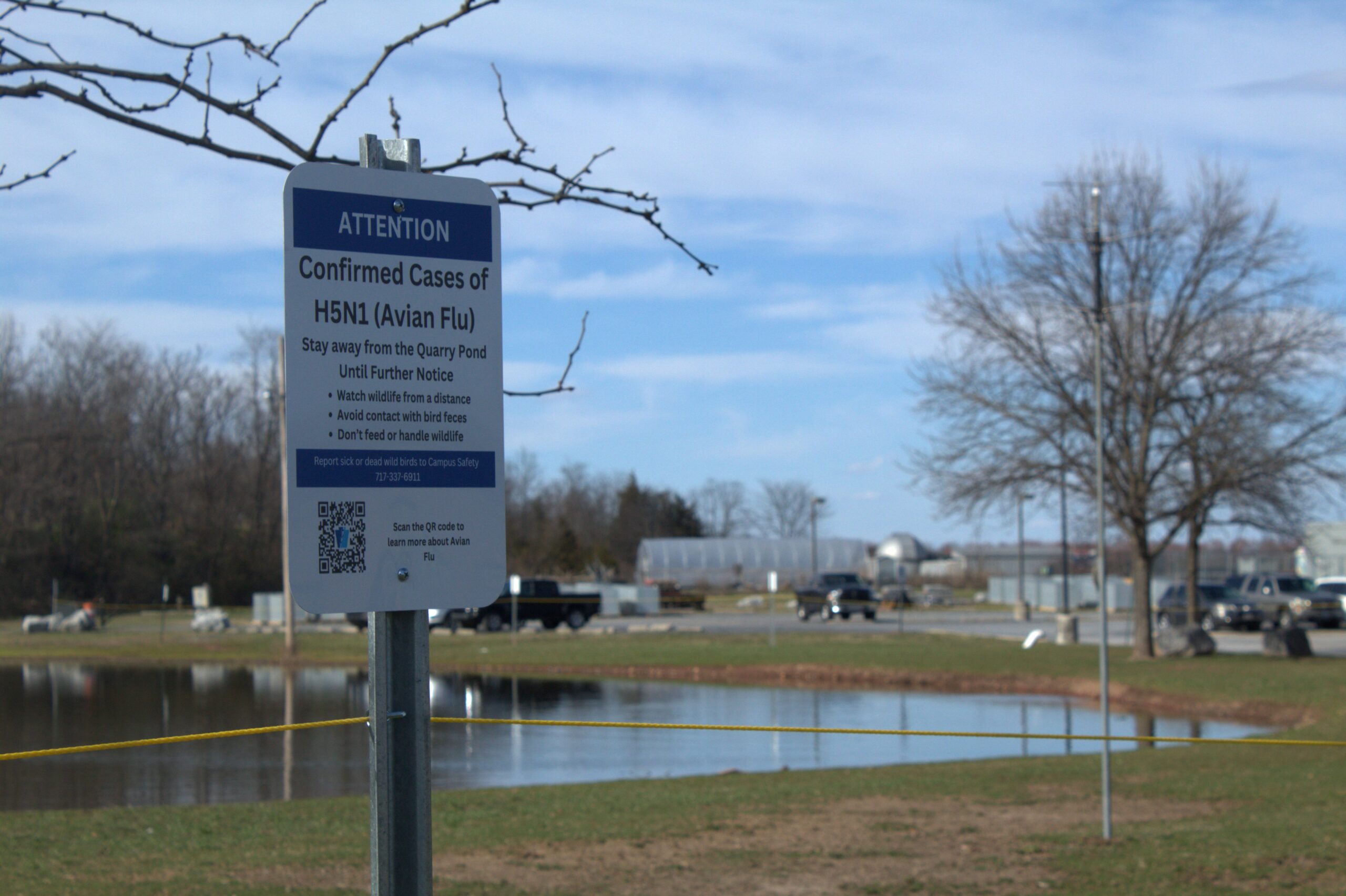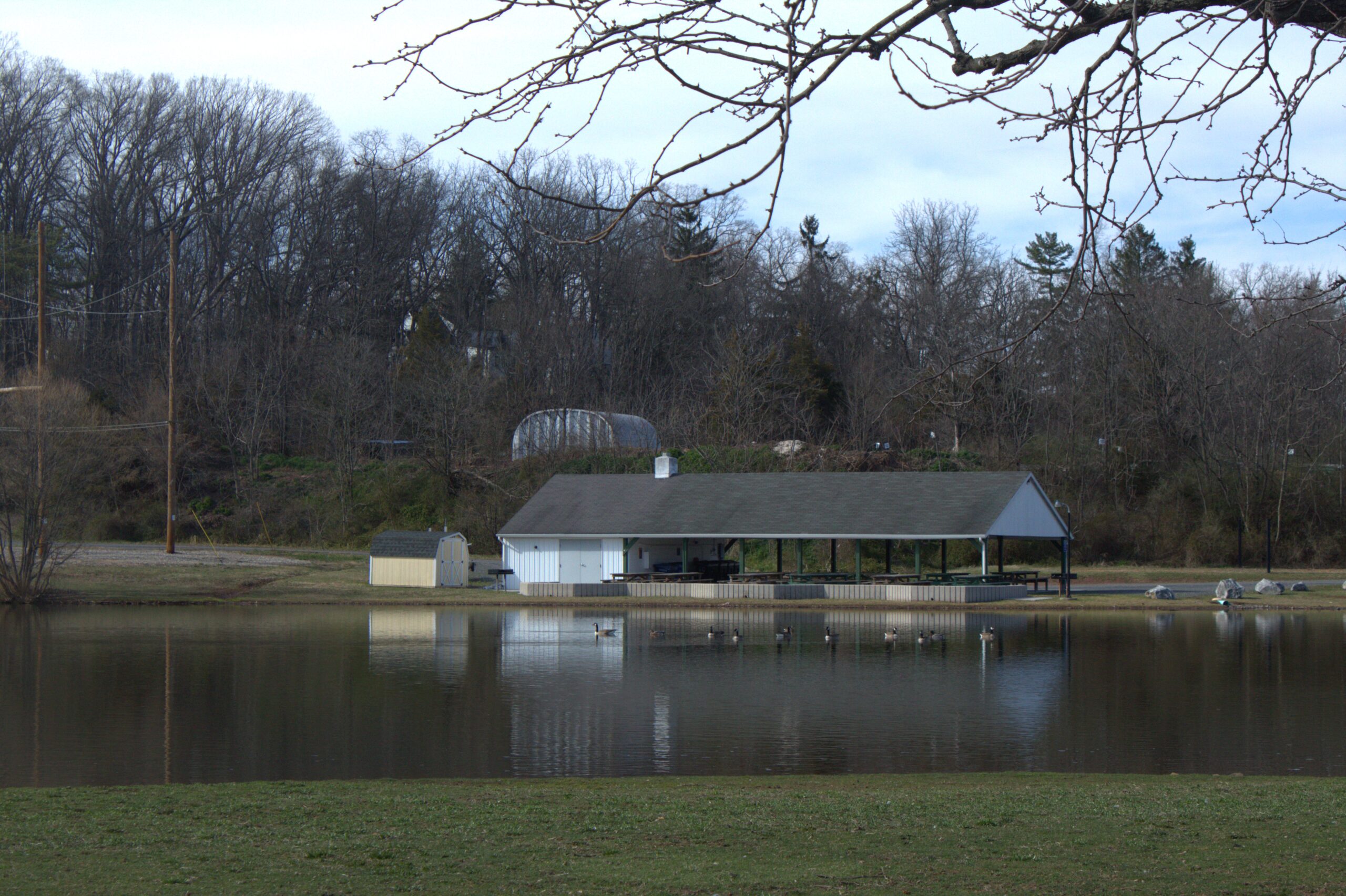CPS Plans Renovation of Quarry Pond with New Wildlife

Quarry Pond recently reopened after closing due to the presence of bird flu in nearby geese. (Alice Van Etten/The Gettysburgian)
This article originally appeared on pages 6 and 7 of the No. 5 April 2025 edition of The Gettysburgian magazine
By Nathaniel Swindell, Staff Writer
The Center for Public Service (CPS) at Gettysburg College has announced plans to renovate the area surrounding Quarry Pond in the coming months, in the hope of making the pond cleaner and safer for the local wildlife, particularly the nearby bird population. The project will mainly involve transplanting wildlife from the Campus Greenhouses to the Pond to improve the local environment.
“The goal of this project is to make Quarry Pond a healthier environment for all of the organisms that call it home,” said Cameron McIntyre ’27, a coordinator for the program and a member of student sustainability. “Over a dozen bird species hunt and/or nest on its perimeter. By planting native flowers, shrubs, and trees, we can dramatically increase the available bug biomass for the birds to feed on, and create additional habitat for them to nest. These bugs include endangered butterflies and bees which will be able to strengthen their own populations despite predation thanks to the resources provided by native plants and flowers.”
Last year, McIntyre contacted Betty Ferster, an assistant professor in the biology department, to help him with growing plants for the project.
“My research involves understanding how plant diversity is related to butterfly diversity, and I helped a student, Grace Verbruge, start a pollinator garden on campus a few years ago,” said Ferster. “Three summers of X-SIG student researchers collected diversity data and tended that garden. Cameron reached out about a year ago to ask if I would help him grow plants to replace non-native plants around campus. He recently came to me with the idea of growing plants for a buffer around the pond to increase biodiversity and ecosystem function. I plan to continue to collect diversity data on campus to follow the results of this project with X-SIG students this summer.”
Specific plants have been chosen to be placed around Quarry Pond for the renovation, including those that will tend to the local insect population and create a more stable ecosystem.
“To me this Quarry Pond buffer is an extension of the pollinator garden,” said Ferster. “A lot of the plants we’ve chosen to grow are host plants for butterflies. There will be a lot of milkweed. We’re tending hundreds of tiny black-eyed Susans, and native grasses get repotted this week.”
The biology department emphasized not only the expansion of plants that live in and near the pond but animal life as well, all of which provide their own benefits for the area.
“Aquatic plants will help clean and oxygenate the water,” said McIntyre. “Additionally, they will provide food and habitat for the numerous fish, amphibians, and turtles that inhabit our pond.”
“Right now, the Quarry Pond has little vegetation growing around it except grass that gets mowed,” said McIntyre. “The plan is to add a more complex strip of native plants around the pond and some emergent plants in the pond. Native plants will support native animals. Plants take up excess nutrients, absorb and store carbon, moderate flooding, and other things.”
At the moment, due to concerns about bird flu and the end of the local goose migratory period, there is no exact date for when the renovations might begin, but the hope from the department is that they will begin within the next month. In January, several dead geese found at Quarry Pond were confirmed to have bird flu, necessitating the closure of the pond and causing delays for the project.
“Since the pond is currently closed due to H5N1 bird flu, I cannot give you any exact dates for the project,” said McIntyre. “The pond is expected to open again once the goose migratory period ends, but that is different every year. Hopefully, the migration ends sometime [in March] and specific project dates can be planned before the semester is over.”
CPS plans to take plants and place them near the pond to reduce the presence of the geese, in order to make the entire area cleaner. That does not mean they hope to drive them away entirely, but simply reduce the number of geese around the pond.
“We plan to transplant the plants we’ve been growing into a “buffer” along the eastern shore of the pond where the Canadian geese like to congregate,” said McIntyre. “Ideally, this buffer will reduce their presence since geese prefer [the current] open access to water with little obstructions around that could harbor predators. There will still be geese at the pond.”

Photo by Alice Van Etten/The Gettysburgian
McIntyre acknowledged the benefits of having geese, though he explained that an overabundance of the birds could result in the spread of diseases, not to mention making the entire area undesirable for student activity.
“Personally, I enjoy [the geese] and recognize their beneficial role in a habitat. However, too many geese in one area leads to feces everywhere and the spreading of diseases,” he said. “A desired result from reducing their presence at the pond is to encourage student use of the eastern grass field. Not every college gets its own pond to enjoy, and it is a shame that no Gettysburg students take advantage of this privilege due to, understandably, unhygienic conditions.”
Additionally, CPS plans to renovate Quarry Pond until it resembles a more traditional park, adding things such as flower beds to cultivate a more positive mental atmosphere.
“The eastern side of Quarry Pond has so much untapped potential,” said McIntyre. “This year, our buffer will bring colorful flowers to the landscape. Next year, maybe we can expand this vegetation and turn the area into a proper community park. A healthy, biodiverse ecosystem on campus has an infinite potential for education and research led by our environmental science and biology faculty. It will inspire students and facilitate more environmental awareness for all of those who visit. Not to mention the mental health benefits such a space can provide.”
The project is being supported by departments around campus, all of which are coming together to help improve the environmental situation of the pond and ensure it remains clean for both local wildlife and the student body.
“I want to thank the environmental studies and biology departments for their support in this project as well as campus grounds for their partnership in making it happen,” said McIntyre.

April 8, 2025
I’ve met this McIntyre kid the last time I visited Gettysburg College. He came across as pretty sharp and had some well thought out plans for how to improve the environment around the campus. I’d keep an eye on him. I think he’s just scratching the surface.